Before I temporarily put the lid back on the box, though, there’s still one project lingering in the background unreleased, “Easy Listening for the Hard of Hearing”, Frank’s collaboration with Boyd Rice from the summer of 1981, which eventually got its release in November 1984 and seemed to baffle the majority of listeners at the time through its unconventiality. Those who followed Mute would already have been familiar with Boyd Rice’s repetitive, hypnotic and, ultimately, brain confusing loops but for the more pop oriented Fad Gadget this was an enormous departure, as any concept of song structure was thrown entirely out of the window. Many thought the outré ingredient was the American one. However, on the DVD documentary, Rice, who is also known for his enthusiasm for sixties girl singers and saccharine sixties and seventies bubblegum pop, sets the record straight: “Frank wanted to work with me because he had a reputation for doing Fad Gadget and he wanted to do something far more abstract and extreme or harsh and I wanted to work with Frank because I had a reputation for doing noise and I wanted to do something far poppier. So, when the album came out, I think people assumed that all the noisy stuff was my contribution and all the poppy stuff was Frank’s contribution and, I think, at the end of the day, that really wasn’t the case...We’d go into the studio and just bang different stuff together, drag metal across the floor, filling up sixteen tracks. Then we’d randomly, in the middle of this tape, make a loop of this and we’d listen back to all this and pick out the ones that were the most cohesive or, in some cases, the ones that were the least cohesive and mix them together or put them through various effects and electronic devices and we came up with stuff that didn’t sound like anything else. Even though it ended up taking a few years to come out it still didn’t sound like anything else that anybody else was doing at the time.” That final comment certainly hits the nail on the head, too, as, apart from a very small number of emerging artists, such as Coil, Current 93, Nurse With Wound et al, as well as the mighty Throbbing Gristle, there wasn’t much back then with which to have drawn even the most tenuous comparison. The duo even gave their experimentation a live outing, a few months later, when they played on the same bill as Sonic Youth and Manchester industrialists, Tools You Can Trust, as part of the ICA’s “I Want Independents” week of concerts in March 1985. A review in the NME by Agnes Gooch, although not negative, was rather non-committal, perhaps confusedly so: “Fad Frank and Boyd Rice, the La Becque sisters of industrial noise and easy listening for the hard of hearing, performed a highly polished, nicely synchronised piece with a mystery axeman. A kind of radical root-canal rendition of ‘Marathon Man’, in which Fad silhouetted by fairy lights and Boyd in hat would question the silence (is it safe?) then punish it with a jolt of hydrollically(sic) satisfying pulses (viz ‘Ricky’s Hand’). The rest was mute.” Video footage of this event is in existence and one extract can be seen on the Mute video compilation, “Tyranny of the Beat : Original Soundtracks”.
What then followed were, for some Fad Gadget fans, The Frank Tovey Wilderness Years, whilst for others they represent the pinnacle of his career. To write about them in detail would, however, lead to this becoming a book rather than an article, so I will gloss over them very quickly, returning only to the tale when the FG name re-emerges from the ashes in a new century. So, meanwhile, a single, “Luxury”, was released in the summer of 1985 and we all went out and bought it because it sounded just like Fad Gadget, only with a glossy sheen - once again, though, it failed to chart - and an album entitled “Snakes and Ladders” came out the following spring, the recordings being populated by a now familiar cast of characters, such that the journey travelled was, initially, not that significant. However, as the 1980s ran out their course and merged blandly into the 1990s, four more albums were released - “Civilian”(1988); “Tyranny and the Hired Hand”(1989); “Grand Union”(1991) and “Worried Men in Second-Hand Suits”(1992) – and the Frank Tovey sound developed enormously. The first two of these albums were released under the name of “Frank Tovey” and adopt a much more acoustic, folky sound but, by the latter pair, he had put together a backing band, The Pyros, formed from amongst London’s Irish musical fraternity and you can sort of guess what the results sound like, although, thankfully, they don’t indulge in that nauseating fiddle-dee crap you hear in Dublin pubs, being much more accomplished and palatable than that. Then, seemingly, there was nothing for almost ten years, the Tovey contribution to mid to late nineties culture being just a few pieces of music composed for plays written by his old schoolfriend, Michael Vale, these sounding like an extension of the sound sculptures Tovey had released as a one-off 12” with Malcolm Poynter and Simon Stringer under the name of Mkultra in 1987 – on Mute, as always.
However, in 1996, Frank Tovey had met a group of Austrian Placebo soundalikes, Temple X, through his girlfriend and, liking their demo, he had agreed to their request that he go into the studio and produce them. Then, as often happens in such cases, one thing led to another and a never stage-shy Frank joined them at some of their concerts to perform slightly rocked-up versions of old Fad Gadget favourites, like the perennial “Ricky’s Hand”. The results were successful and Frank, seemingly, found himself back with the bug. Also, parallel to this, things were picking up musically in certain circles, after the twin bores of Britpop and the tired fag-end of house/dance culture had died away, and events seemed to conspire such that by 2000/2001 the time seemed completely right for a Fad Gadget renaissance, with Frank going on to delight not just the old school but a new and hungry, younger audience.
Consequently, on Easter Sunday of 2001, Fad Gadget made his return to the stage proper, headlining London’s Elektrofest, held at the Astoria 2, his backing band being the catalysts in this adventure, Temple X, and, when news of this performance and accompanying photographs began to appear on the internet, around the same time as Soft Cell’s temporary re-emergence, it felt like a huge, heavy cloud of ennui had eventually floated off over the horizon.
Amongst those gathered to see him that night, when they would otherwise have been at home stuffing their faces with over-priced chocolate eggs, were a couple of members of old friends Depeche Mode, now transported to unimaginably dizzying heights of fame and wealth since the Canning Town gig over twenty years earlier, and, evidently, looking for a suitable support band for the European leg of their forthcoming tour. Impressed as they were, Fad was their choice and, in a tables-turned scenario, Frank soon found himself successfully warming up monster-size crowds in vast arenas and stadiums. However, complete disaster almost occurred, as Temple X’s van was involved in a dramatic accident somewhere in Europe, flipping over, apparently, and ejecting their drummer out of the back doors and onto the ground outside. The broken collar bone he sustained in the accident meant that he would be unable to play the final, British, shows at Wembley Arena and Manchester’s MEN Arena and, to further begin closing the circle, Nick Cash was invited back in to fill the gap. This, then, was the line-up I then saw in Manchester a few months later when Fad Gadget went out on a short headline tour in January 2002, taking in Paris, Amsterdam, Berlin, London, Antwerp and Bielefeld, as well as the aforementioned show. More of this is a moment, though.
In the meantime, a “Best of Fad Gadget” double CD, comprising all of the A-sides and the majority of the B-sides, as well as some 12” versions, was released in the autumn of 2001 to fill a gap for the new audience and also to give him something to promote whilst he was on the road – a similar, although less comprehensive collection had already been released in 1986 – and, in this new context, it all sounded as vibrant and urgent as ever. A four track 12” also came out around the same time to accompany the album, featuring old favourites, “Lady Shave”, “Ricky’s Hand” and “Collapsing New People”, the latter appearing in its Berlin Mix format. However, the lead track was a meaty “Toasted Crumpet Mix” of “Fireside Favourite”, the product of a subtle yet highly effective remix by of-the-moment Sheffield recording artists, I Monster. The potential of what could be done with old Fad Gadget tracks, placed in the right hands, was clear, as well as his relevance in the early years of the decade. A year or so later, the German arm of Mute Records discreetly released another fantastic four track 12”, this time featuring a new mix of “Collapsing New People” by Berlin techno maestro WestBam, alongside the original version of said song and two amazing remixes of “Lady Shave” by John Acquaviva, the “Robo-Sapien Vox” and “Robo-Sapien Dub” versions. These latter tracks, without making vast amendments to the original, captured the zeitgeist perfectly and put Fad Gadget straight back onto the centre of the electro dancefloor, as well as onto compilations such as “Lektroluv 5” where he held his own amongst other contemporary artists such as Bangkok Impact, Polygamy Boys, Solvent and David Caretta.
Anyway, back to Saturday 19th January 2002, when Fad Gadget returned to Manchester University to play in the smaller hall there, which used to be called the Solem Bar but is some Academy something or other now, and played a storming set, whilst engaging in similar antics to yesteryear. The backing to “Ricky’s Hand”, for example, came supported by Frank’s contribution on a handdrill, which span recklessly into the palm of a leather glove; “Lady Shave” came with the pube plucking routine; “Back to Nature” saw him lumbering around the stage gorilla fashion during the opening bars; and for “Ad Nauseum”, a temporarily disappeared Frank Tovey, came back on to the stage with a black bin bag full of feathers which he then tipped over his stickily primed torso. It was a truly memorable night, partly because I’d always been too young to go to his earlier visits to the city and so was seeing him live for the first time but also because he was so energetic, entertaining and engaging whilst performing a host of favourite songs from my youth. Unlike a number of re-formed bands, who appear from time to time, this didn’t feel like a faded re-hash either. A recording was made of the previous night’s show at The Garage in London and, if you watch it, you’ll be able to see for yourself what I mean. I went backstage after the concert in Manchester, too, and had a five minute chat with FT and he was charming and seemed genuinely thrilled that he’d had such an impact on the lives of myself and the person I was with. He also talked of the 1990s having been a bit of a wasteland for him, where he agreed with myself that he’d got a bit bored, really, for several years. However, optimism was in the air now and the promise of the first new Fad Gadget material for eighteen years was on the horizon. If you watch the London show on DVD, you’ll hear him announce to the audience during the latter part of the set, “Even I want more tonight.”
Then, on 8th April 2002, as I’d just come through my front door from a few days in Stuttgart, where I’d been on a bit of an Oskar Schlemmer / Baader Meinhof pilgrimage, I played my answering machine messages back and received the devastating news that Frank Tovey had died of a sudden heart attack at his home six days earlier and, even though I didn’t know the man, the news hit me right in the core of my stomach. In one split second, a few words took away all the optimism of the previous few months, as well as someone who had been a significant companion throughout my most significant years. How his family and friends must have felt, I cannot imagine.
Anyway, time has rolled on, the memory is still well and truly alive, as evidenced by the CD/DVD release and the continued success of the official website, and his legacy and influence, too, continue to be heard in people like the fabulous Mechanical Cabaret, who covered “I Discover Love” on their second album. What a different and dreary world it would have been had Fad Gadget never come out of his closet, as it were.
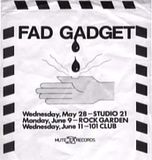
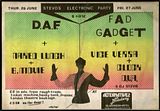
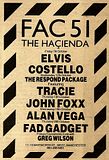
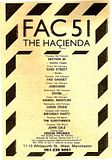
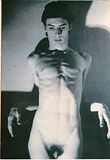
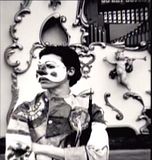
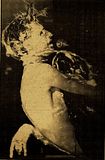

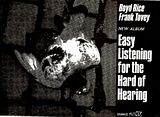
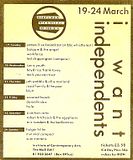

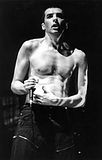
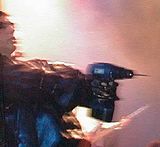
Have you ever thought about turning this into a book FS? You should get in contact with some publishers and show them this.
ReplyDeleteDee x